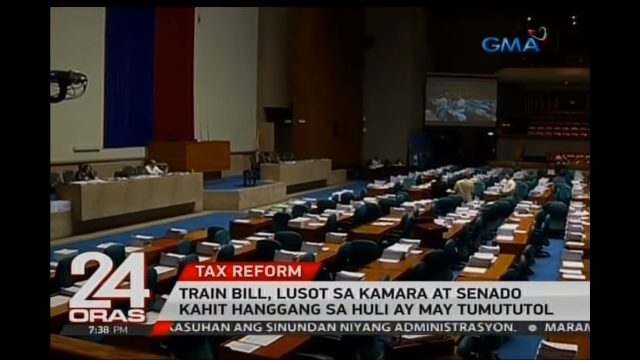Without a Quorum: TRAIN Railroaded into Law

Screengrab from GMA News’ Youtube account.
WITH OR without the distractions of December, Congress has always had to deal with empty seats. But the absent members of Congress stand out on certain occasions, as they did when Congress railroaded the passage of TRAIN.
The almost empty hall did not deter the passage of the Tax Reform Acceleration and Inclusion (TRAIN) bill into law. The Senate and the House of Representatives approved the legislation on December 13, 2017. The ratification was controversial, as the joint session acted on it at 10 PM with only 10 lawmakers present, a number way below the number required to establish a quorum.
ABS-CBN 2’s TV Patrol, GMA-7’s 24 Oras and CNN Philippines’ News Night reported the absence of lawmakers, airing the clip of objection of party list Rep. Antonio Tinio of ACT Teachers pointing out that there was no quorum, as Deputy Speaker Raneo Abu proceeded to approve the motion of Iloilo 3rd District Rep. Arthur Defensor Jr. to ratify the bill.
TV Patrol and 24 Oras also reported that copies of the bicameral conference committee report were not distributed to the members, referring to Rules of the House of Representatives, specifically Rule 10, Sec. 63 on Conference Committee Reports which says that a copy must be distributed and that “a conference committee report must be ratified by a majority vote of the Members of the House present, there being a quorum.”
These news programs did not say why the representatives were absent. Online news site Rappler and broadsheets Malaya, Manila Bulletin, BusinessWorld and the Philippine Daily Inquirer quoted Tinio’s claim that most of the representatives were in PDP-Laban’s Christmas benefit dinner for Marawi, held in Sofitel Philippine Plaza Manila, a five-star luxury hotel in Pasay City. President Duterte himself was at the party.
Only Rappler checked the attendance sheet, pointing out that “Although only a handful were physically present at the session on hall, on paper, 232 House members responded to the roll call at around 4 pm.” (ACT Teachers Rep mad over tax reform ‘railroading’ as PDP-Laban ‘parties’)
The media did not raise questions about the legality of the approval. No reporter pursued Deputy Speaker Abu, the presiding official who declared the “unanimous approval” of the bill, to ask him to explain how the lack of quorum affected the legality of the approval.
Asked about the issue, House Majority Leader Rodolfo Farinas who said he was neither at the PDP-Laban dinner, asserted that the bill was “validly ratified” and that lawmakers who have complaints can “go to the plenary, or, if not satisfied, to the courts.”
The failure to discuss this issue in reports about the passage of TRAIN strongly suggested that passing the laws without a quorum as normal, that this lack did not need to be discussed further. Opposition lawmakers from the Makabayan bloc, Tinio included, said last December 14 that they would bring the TRAIN law to the Supreme Court to challenge its legality, given the manner the bill was ratified.
As of January 6, Tinio said they have been finalizing the petition that will question “procedural and substantive issues” surrounding the measure. Earlier on December 16, Isabela Rep. Rodolfo Albano III, Majority Leader of the House Committee on Appointments, said in a Philippine Star report that he was confident the Supreme Court will “presume regularity”of the passage.
With Duterte’s signing the bill into law, the media has continued to report on TRAIN as a done deal, predicting its inflationary pressure on consumer prices in 2018.
TRAIN is only the first phase in the Duterte administration’s comprehensive tax reform program. It exempts Filipinos with an annual income of PHP250,000 and below from paying personal income tax. It increases the excise tax on some goods and services such as sweetened beverages, oil and gas. Hailed by government as a major legal effort to correct infirmities of the current tax regime, TRAIN is also regarded as a crucial measure to assure the implementation of the administration’s ambitious “golden age of infrastructure.”
Media needs to rouse itself from the passive mode, with reporters waiting for things to happen. TRAIN has been on the agenda for some time. But unfortunately, given the technicalities involved in any tax issue, media reports have not engaged ordinary Filipinos, its relevance on people’s lives overtaken by the claims made by government sponsors.
The habit of this administration to ram its policies through without the benefit of critical discussion challenges the media to engage all stakeholders more actively and question government’s premises and propaganda, before policies are cast into stone.
Leave a Reply